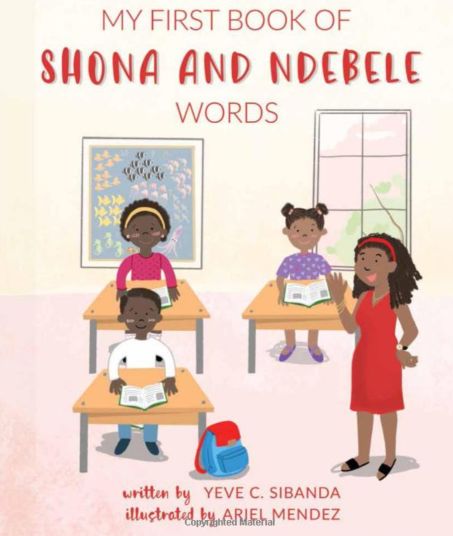My First Book of Shona and Ndebele Words
 My First Book of Shona and Ndebele Words
My First Book of Shona and Ndebele Words
Picture Book / Ages 5-8 / Zimbabwe
Mascot Books
May 4, 2021
38

"Little learners will read essential first words in Shona and Ndebele, the two main native languages of Zimbabwe. Colorful illustrations are paired with simple first words for readers of all ages to learn." Publisher
My First Book of Shona and Ndebele Words by Yeve C Sibanda is a beautifully illustrated book that teaches young readers English, Shona, and Ndebele words. The colorful pictures of people, buildings, cars, animals, and the general landscape make the book attractive to children still learning to connect images and words. The book offers the reader a chance to learn words in all the three main languages in Zimbabwe: English, Shona, and Ndebele; a reader with proficiency in only one of these languages can sample two other languages. My First Book of Shona and Ndebele Words is logically structured, moving from descriptions of the body to clothing, transportation, school, and family occasions. Sibanda offers a text that not only teaches words but Zimbabwean social customs.
In Zimbabwean culture, parents teach their children to acknowledge people through the ritual of greeting. Greeting people, particularly elders, and even strangers one meets on a bus, is a sign of respect. A child who does not greet visitors is an embarrassment to parents. Greeting acknowledges a persons’ hunhu/ubuntu, that is, their humaneness. Furthermore, in My First Book of Shona and Ndebele Words, there are words that children can use to show gratitude. In Zimbabwe, parents teach their children the importance of being thankful. Children learn to thank their parents for food, schoolbooks, uniforms, and virtually everything they receive. My First Book of Shona and Ndebele Words is an excellent resource for teaching Zimbabwean customs and traditions to young readers.
One striking feature of this book is that the author uses images of black people. As a Zimbabwean who grew up in Rhodesia, the name of the country before independence, most of us played with white dolls and read books with pictures of white people. We were encouraged to learn English and forget Shona and Ndebele and many other indigenous Zimbabwean languages. The emphasis on the English language and culture made us have a strong desire for whiteness in all aspects of our lives. In My First Book of Shona and Ndebele Words, the images of African children with their natural hair gives positive messages about blackness. The chance to learn English, Shona and Ndebele place the languages in an equal position, which is important for young readers to know.
Tembi Charles, PhD Candidate
University of Pennsylvania
Published in Africa Access Review (March 25, 2022)
Copyright 2022 Africa Access
